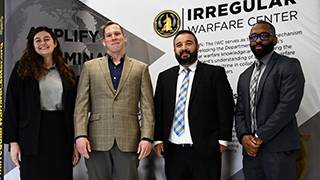Diplomacy Alumni Participate in Irregular Warfare Center (IWC) Conference
Monday, December 9, 2024

From left, Seton Hall alumni Anneiliese Preske, James Miel, Professor Mohamad Mirghahari, and Del Sanders participated in a conference on irregular warfare.
In September, several School of Diplomacy alumni participated in the two-day “Irregular Warfare Lessons Learned Since 9/11” conference held by the Department of Defense’s Irregular Warfare Center and the Foreign Policy Research Institute.
The conference brought together military leaders, policymakers, scholars and intelligence experts to analyze key insights from irregular warfare over the past two decades. It emphasized the center’s role in advancing DoD’s irregular warfare strategies through three main efforts: enhancing global irregular warfare networks, identifying emerging threats and addressing ongoing security challenges.
Key discussions covered tactical challenges in counterinsurgency, intelligence and military logistics. Distinguished attendees included Maren Brooks, deputy assistant secretary of defense for irregular warfare and countering terrorism, who delivered the keynote; John Nagl, D.Phill., of the U.S. Army War College; and Michael Vickers, the former undersecretary of defense for intelligence. Among these notable figures were three School of Diplomacy and National Security Fellowship alumni: James Meil, Del Sanders and Anneliese Preske.
James Meil, who earned both a bachelor’s and master’s in international relations from Seton Hall, presented his paper, “Sustaining Power: Addressing the Critical Shortfalls in U.S. Military Sealift Capabilities for Great Power Competition.” His work, completed in collaboration with Maj. Gen. (Ret.) Ed Dorman, focused on the importance of sealift operations for modern military logistics.
Meil highlighted the unique opportunity the conference provided for candid, in-depth discussions. “It’s rare to have an environment where people can speak openly without needing to water down their insights for a wider audience. The presentations were tailored to a knowledgeable group, which made for really in-depth conversations,” he explained.
Reflecting on the conference’s themes, Meil emphasized the lasting importance of irregular warfare amid growing attention to great power conflicts. He noted that methods like cyber and economic tactics will remain essential. Reflecting on past operations, he observed, “While unconventional warfare can achieve combat success, it doesn’t always secure lasting stability, a gap that must inform future strategies.”
Del Sanders, a senior special operations forces irregular warfare analyst, received a Master of Science in international relations and affairs with a specialty in global negotiation this past year. Sanders presented on human terrain, emphasizing its significance in irregular warfare. “Human terrain represents the social, cultural, geographical, religious and political landscape in which any operation or engagement occurs. Understanding the human dimension allows for more effective decision-making, particularly in irregular warfare environments where influence, trust and perception can outweigh pure military strength,” Sanders said.
His presentation underscored that human terrain analysis should be integrated early in operational planning to enhance effectiveness. Sanders highlighted the need for professionals who combine academic knowledge with special operations experience to bridge gaps between decision-makers, operators and scholars.
Sanders found the event valuable for exposure to diverse experts, noting that it provided an opportunity to gain new insights and validate some of his theories.
Anneliese Preske, who earned her master’s degree in international relations in May, attended in her capacity as a public affairs specialist for the Irregular Warfare Center. Preske shared her enthusiasm for the role, stating, “It’s been amazing to support the Irregular Warfare Center at the IW Lessons Learned conference. Last year professor Mirghahari nominated me to present at the inaugural IW colloquium, and I knew I wanted to stay involved.” Preske highlighted the event’s value in deepening her understanding of irregular warfare and connecting with leaders in the field.
The participation of Seton Hall alumni at the “Irregular Warfare Lessons Learned Since 9/11” conference underscores the School of Diplomacy’s dedication to cultivating future leaders in irregular warfare. Through the contributions of Meil, Sanders and Preske, the conference showcased the importance of integrating academic knowledge with practical experience.
As irregular warfare evolves, these alumni demonstrate the critical thinking and innovation needed to tackle ongoing security challenges. Their insights contribute to shaping strategies that address complex global landscapes, ensuring that lessons learned will inform future operations and decision-making.
Categories: Nation and World






